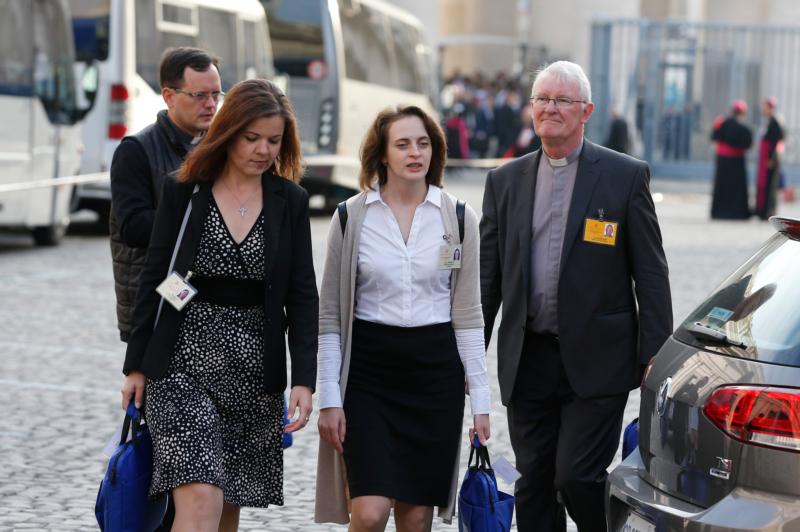
Synod delegates arrive for a session of the Synod of Bishops on young people, the faith and vocational discernment at the Vatican Oct. 16. (CNS photo/Paul Haring)
VATICAN CITY (CNS) — Young people today are telling Catholic leaders that if they want to persuade the young to follow Christ and pursue a vocation, church leaders must be models of Gospel behavior, said the head of the De La Salle Christian Brothers.
Members of the Synod of Bishops have made repeated references to the story of Jesus and the rich young man in the Gospel — how Jesus told him to sell everything and follow him; several synod members have cited the passage to affirm that Jesus continues to place tough demands on young people.
But Philadelphia-born Brother Robert Schieler, superior general of the brothers, suggested another way of looking at the story. He asked members of the synod to consider “that we, the church, are the rich young man.”
[hotblock]
When the story is about Jesus’ demands on the church, rather than on young people today, he said, then it becomes a challenge to the church “to embrace risk, to be willing to leave our individual and collective comfort zones and to trust in divine providence.”
Young people who challenge the church in that way, he said, “are trying to tell us: ‘If you are inviting me to consider a Christian vocation, I expect you to model for me Gospel behavior.'”
Brother Schieler was one of several U.S. synod members to address the gathering Oct. 16 and Oct. 17.
Byzantine Archbishop William C. Skurla of Pittsburgh used the synod as an opportunity to publicly thank Pope Francis “for restoring our ancient practice of marriage for priests,” including those living outside the traditional East European homeland of the Ruthenian church.
“The restoration of the married clergy in 2014 has increased the number of seminarians and allowed ordained married priests from our churches in Eastern Europe to come to the United States” and minister, the archbishop said. “The new priests have renewed and revitalized our church in the United States.”
Archbishop Skurla had a very practical suggestion for after the synod: Each diocese or eparchy should have a priests’ assembly that would include representative young people. The purpose would be to share ideas from the pope, the synod’s final document and, “most importantly,” examples of successful programs already taking place in parishes.
[hotblock]
Maronite Bishop Abdallah Zaidan of Our Lady of Lebanon of Los Angeles told the synod the Catholic Church needs to figure out a way to get young people as fascinated with God as they are with their phones and tablets.
“We need to be able to relate our faith to the youth,” he said. “We need to coach them to take God with them wherever they go,” just like they take their phones.
“Probably,” he said, “the church should invest resources to design educational platforms, games and interactive tools on their phones and computers in order to engage young people so they get to know God better and love him more.”
The bishop also pleaded with his Latin-rite brothers to be open and sensitive to the needs of young migrants from Christian communities in the Middle East.
“For many of these displaced people, the church is a source of comfort and connection to their heritage,” he said. “It offers hospitality, integration into the fabric of society and supports them in their new countries.”
With migrant communities, Bishop Zaidan said, the priests are not only essential spiritual guides, but they help connect migrants to others in the community and to housing and job opportunities.
U.S. Cardinal Kevin J. Farrell, prefect of the Dicastery for Laity, the Family and Life, said the synod marked a “time of grace” for the Catholic Church, but he spoke even more of “another special time of grace” that was launched with St. John Paul II’s establishment of World Youth Day.
When the event is well-prepared and bishops consciously devise follow-up activities, he said, World Youth Day has been a verifiable blessing.
Although synod members only get four minutes each to speak, Cardinal Farrell used his time to cite a report from Uganda showing how young people who participated in World Youth Day are taking up “significant roles in the leadership of the church” in their country, and a study from Australia in which 98.6 percent of young people under 18 who attended World Youth Day 2005 in Cologne, Germany, said the event strengthened their faith.
And, he cited a report from the U.S. bishops’ conference that “one in five priests ordained in 2013 and one in four religious men and women who professed vows in 2013 participated in and had a good experience of World Youth Day.”
Cardinal Farrell ended by expressing his hope that World Youth Day 2019, which will take place in Panama in January, will be another opportunity to “contemplate and celebrate together the fruits of this beautiful process.”
PREVIOUS: Synod briefing: Bishops optimistic about digital outreach to young people
NEXT: Chinese provincial official: Vatican will interfere in religious affairs



Why is there so much emphasis on the young? They’re supposed to be learning from the old. Maybe that’s their problem.